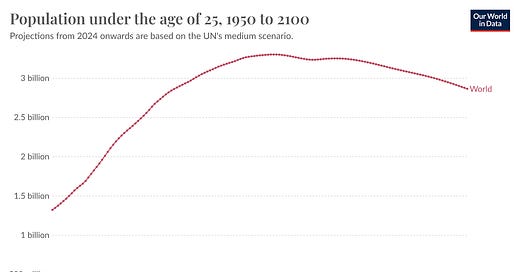I quite often think about an Albert Johnson poem where he writes “I can see it inside your face, you’re in the wrong place”. I doubt that I’m the only builder who has occasionally felt that perhaps you’ve spent a whole bunch of time just doing the wrong thing. I mean, if you’re not working on AI, defence or climate, why are you even bothering to start a company?
I have complicated views on this.
My general life philosophy is that you should use your time to be productive in a vaguely useful way to the world. Historically I’ve found that building companies provides the most leverageable form of that statement1. But the logical extension of that philosophy leads very easily to the founder-on-founder mission-shaming that I have also been guilty of in the past (as indeed have a few readers here). It is very easy to describe problem selection for building companies in terms of civilization-level impact. However, filtering that list for commercial viability frequently leads to decisions between the very slow or a lifetime of VC dependence. Or, you know, ads.
I mean, look. I think it’s important to try and do important work but I absolutely do not believe it’s the end of the world if you aren’t (as long as, you know, it isn’t deliberately civilization-destroying). If you have a choice to build a company (of any kind) or not, you should! It’s a very worthwhile life-learning exercise which will make you better at almost everything else.
I think I have learned the following lessons about what kind of company to start, which may or may not be applicable to anyone reading this:
Most of the very big, extremely meaningful civilization-era companies tend to fail. People misunderstand power laws by thinking the average is meaningful or by thinking the top decile is representative. Extreme impact is the exception.
It is perfectly fine to want to make money in order to channel that money to good things which you yourself cannot achieve. Notwithstanding some unfortunate recent ambassador choices, the Effective Altruism movement doesn’t strike me as totally nuts in that regard.
It’s totally okay for the definition of ‘important’ to be ‘important to you’. That said, I’ve never really trusted passion as a driver of companies, it seems to get in the way of good analysis. Whatever you’re building does need to be interesting (to you) though.
One of the reasons I think building something is preferred to building nothing is that you you won’t know what happens on the journey. Slack, penicillin, GLP-1s and aspartame were by-products of people doing other (in many cases far, far less important) things.
With the exception of existential life threats, ‘important’ is only a function of what people convince the world of. AGI appears to be an excellent example of this.
There are more than a few investors who fall into the looking-for-a-man-in-finance category to scratch an itch they have about a perceived problem. I think generally you should avoid inheriting investor ideas unless they have very specific domain expertise
If you’re ever feeling particularly inferior to what other people are building, the guaranteed antidote is to read any decent stretch of human history. Life is much bigger than any one company.
It’s a sobering fact that we are probably at peak young people.
Although the UK is quite focused on getting rid of their resident non-dom tax program (where you pay tax only on your UK-based income), it’s interesting to see Portugal spinning their version of this back up on the basis that they need more young professionals paying tax domestically. Looking at European demographics, it seems entirely credible that a lot more countries will start rolling out versions of this.
Updating Eric Seufert’s description: Everything is an ad network until management realises it means sales people. There are going to be a lot of spin-outs/divestments of newly established ad divisions and retail media teams over the next few years…
Reading/listening
(Btw here’s my essential reading list for founders if you need summer suggestions)
Prompted by a conversation where I was corrected on dopamine, I’ve been trying to get smarter on this. The more I learn, the more I think this should be mandatory requirements for anyone building UX for consumer services. Naturally Huberman has an excellent episode.
Billion Dollar Whale: I had always been aware of the existence of the 1MDB scandal but now that I’ve read about it, just wow. Goldman Sachs + all sorts of middle/far eastern geopolitics + Swizz Beatz + Leonardo di Caprio + Hollywood. Absolutely up there with FTX.
Carlo Rovelli writes about physics in a truly beautiful way. The Order of Time is no exception. Profoundly thoughtful.
Newsletters are becoming an ever-closer number two though




Completely agree. The things I am interested in having changed over time (no surprise).
I try not to shame any builder.
I normally just question is the thing they were put on this planet to do and is now the right time?
I think most of us are quite capable of many great works / builds in our lifetime